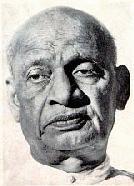|
Patel went out of his way to assure Muslims
that he was, indeed, their true
friend
 Fifty years after India won freedom, the myth that Sardar Patel
was anti-Muslim persists. In this fascinating essay,Dr Rafiq Zakaria,
the respected scholar, reveals the truth about Patel
and India's Muslims.
Fifty years after India won freedom, the myth that Sardar Patel
was anti-Muslim persists. In this fascinating essay,Dr Rafiq Zakaria,
the respected scholar, reveals the truth about Patel
and India's Muslims.
But somehow the impression persisted that the Sardar continued
to be a Hindu communalist at heart; it was much stronger before
the assassination of the Mahatma. Patel had thereafter considerably
mellowed and was much more careful in his utterances. He went
out of his way to assure Muslims that he was, indeed, their true
friend. Moreover, there were other pressing problems, particularly
the consolidation of princely states, which had occupied most
of his time. His health had also begun to fail.
Much of the differences
with Nehru had been smoothened, the Sardar's stand in favour of
the Nehru-Liaquat pact had strengthened the relationship. A few
months before the Sardar's death, the communal problem surfaced
again, in an entirely different context into which Patel, somehow,
got dragged. Tandon, with his anti-Muslim views, decided to contest
the Congress presidentship; Nehru though this would give a fillip
to Hindu communal forces.
In a frank letter to Tandon ( a copy of which he endorsed to Patel)
dated August 8, 1950, Nehru wrote: 'We have many major problems
in India, but I feel more and more that perhaps the most important
of them is how to hold fast to certain basic ideals of the Congress
as it used to be. One of these, which is of supreme importance
today, is to fight against communalism. I see this communal spirit
growing and spreading in India, together with something that I
would call revivalism. I know all that has happened in Pakistan
and that this is the reaction to it in India. But that is partly
an explanation; it does not help. I has brought out all the intolerance,
pettiness and narrow-mindedness in our people and I fear that
India can near progress if we think and function in this way.'
Nehru made a pointed reference to Tandon's presidentship of the
refugees conference in Delhi which 'gave expression to views
which struck me as excessively intolerant, communal and impractical.'
These could easily, he wrote, 'lead us into wrong directions'
He added, 'I think the major issue in this country today,
if it is to progress and to remain united, is to solve satisfactorily
our own minority problem. Instead of that, we become more intolerant
towards our minorities and give as our excuse that Pakistan behaves
badly. What happens to Pakistan is not my primary concern. But
I am most intimately concerned with what happens to India, and
this progressive decline in some of the basic thins of life distressing.'
Tandon was quick in his reply. He refuted the communal charge
against him in his letter to Nehru dated August 12, 1950. 'Obviously
you have the Hindu-Muslim question in mind when you speak of communalism.
You were present at the last political conference of our province
when I spoke for about an hour and a half as president. I expressed
then clearly my views on the Hindu-Muslim question in general
and on the cultural relationship between the two communities in
particular.
'I have never deviated from the views then expressed.
I do not recognise any Islamic culture or any Hindu culture. I
do not recognise that there is any book in the world which has
said the last word on what man should be. Neither the Veda nor
the Quran is the last word for me in human thought.
'Muslim divines
take umbrage at my expressing this view and say I am anti-Muslim.
I thought you would at least would rise above that outlook. The
old-world Pandits of Banaras also dislike my views and attack
me freely in their organs -- the Hindi daily Sanmarg is an exponent
of their views. My leading thought in politics is an all round
unity in the country as far as it can be achieved with unavoidable
and necessary diversities being kept within proper limits. I have
openly advocated Hindu-Muslim marriages and, as you know, caste
orthodoxy has played little part in my life. I am, therefore,
surprised at your connecting me with a communal outlook.'
Excerpted from Sardar Patel and Indian Muslims, by Rafiq Zakaria, Bharatiya Vidya Bhavan, 1996, Rs 125, with the author's permission. Readers interested in buying a copy of the
book may write to Bharatiya Vidya Bhavan, Kulapati K M Munshi Marg, Bombay 400 007.
|

